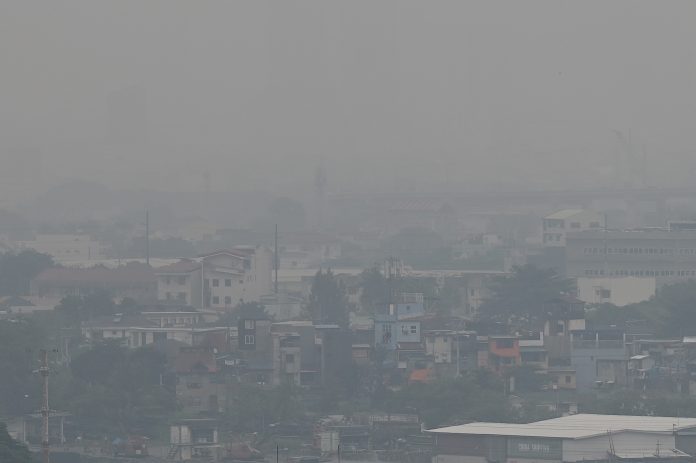Environmental advocates called for stringent revisions to the Philippines’ air quality standards as volcanic smog and industrial pollution continue to shroud Calabarzon and Metro Manila.
This week, residents faced a series of health alerts and school closures due to emissions from Taal Volcano and high levels of particulate matter 2.5 (PM 2.5).
On Tuesday, the Department of Environment and Natural Resources (DENR) declared the air quality in parts of Metro Manila as “very unhealthy” and “unhealthy for sensitive groups.”
The Power for People Coalition (P4P) emphasized the urgent need for updated air quality guidelines in response to these alarming reports.
“We hope that all are safe from the Taal-driven emissions and concentration of smog in NCR. Air pollution is a silent killer – and it’s especially worse in sites host to polluting industries like coal power plants, for whom toxic air is an everyday normal,” said Gerry Arances, convenor of P4P.
The Center for Energy, Ecology, and Development (CEED) published a report last year confirming that air quality near coal-operated sites in Quezon and Sarangani far exceeds the DENR’s standards for PM2.5 and PM10 levels.
These findings starkly contrast with the stricter standards set by the Environmental Protection Agency (EPA) and World Health Organization (WHO).
Fr. Warren Puno of Quezon for Environment (QUEEN), and Director of the Ministry of Ecology of the Diocese of Lucena, remarked on the prolonged exposure to polluted air in regions known as the country’s “coal capital.”
“While these coal power plants increase electricity costs, they rob our communities of clean air, impacting the most vulnerable—our sick, and our children,” he said.
The environmental groups assert that revising the National Ambient Air Quality Guidelines Values under the Clean Air Act is crucial and should be prioritized by the DENR.
“The DENR is trifling with the lives of Filipinos by delaying the update of our air quality standards. We cannot settle for less stringent standards that are already implemented internationally,” Arances said.
Recently, critics have condemned Energy Secretary Lotilla for allowing the expansion of the Aboitiz-owned Therma Visayas Inc. (TVI) Unit 3 coal plant in Cebu, despite a standing moratorium on new coal plants.
Nicasio Blanco, President of Limpiyo ang Hangin Alang sa Tanan (LAHAT), expressed the community’s exhaustion and frustration.
“We are tired of living in an environment where even the air we breathe is a health hazard. The coal moratorium was supposed to offer relief, yet expansions like TVI’s threaten to extend our suffering for decades,” he said.
The groups warned that failing to improve air quality standards and enforce environmental protections will continue to jeopardize the health of the most vulnerable populations.









